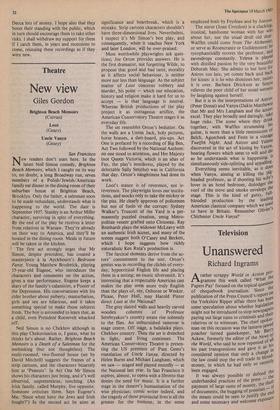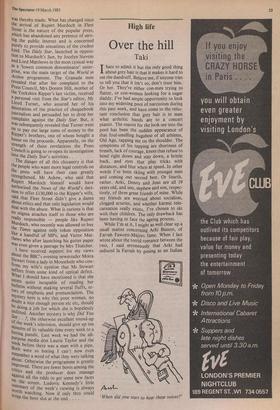Television
Unanswered
Richard Ingrams
A rather scrappy World in Action Pr°- .gramme this week called 'What the Papers Pay' focused on the topical question of chequebook journalism. Since the publication of the Press Council's report on the Yorkshire Ripper affair there has been some speculation about whether legislation might not be introduced to stop newspapers paying out large sums to criminals and their relatives or to witnesses. The chief spoked man on this occasion was the lantern-jawe poacher turned gamekeeper, Mr BarrY Askew, formerly the editor of the News of l the World, who said he now repented of all his past transgressions and gave it as his considered opinion that only a change in the law could stop the evil trade in blood- meoenneeyn, engaged. which he had only so recently b It was always possible to defend thee underhanded practices of the press — th., payment of large sums of money, the thefi f of documents, the bugging of premises
the means could be seen to justify the end and some necessary and welcome exposure
was thereby made. What has changed since the arrival of Rupert Murdoch in Fleet Street is the nature of the popular press, which has abandoned any pretence of serv- ing the public interest and is concerned Purely to provide sensations of the crudest kind. The Daily Star, launched in opposi- tion to Murdoch's Sun, by Jocelyn Stevens and Lord Matthews in the most cynical way asa 'lowest common denominator' enter- prise, was the main target of the World in Action programme. The Granada men revealed that after her complaint to the Press Council, Mrs Doreen Hill, mother of the Yorkshire Ripper's last victim, received a personal visit from the Star's editor, Mr Lloyd Turner, who assured her of his detestation of the practice of chequebook journalism and persuaded her to drop her complaint against the Daily Star. But, it was subsequently revealed that Turner went on to pay out large sums of money to the Ripper's brothers, one of whom bought a house on the proceeds. Apparently, on the Strength of these revelations the Press Council is going to re-open its investigation into the Daily Star's activities. The danger of all this chicanery is that the people who want more legal controls on the press will have their case greatly strengthened. Mr Askew, who said that Rupert Murdoch himself would have authorised the News of the World's deci- sion to offer £130,000 to the Ripper's wife, said that Fleet Street didn't give a damn about ethics and that only legislation would deal with the abuse. What is curious is that no stigma attaches itself to those who are really responsible — people like Rupert Murdoch, who recently was allowed to buy the Times against only token opposition like a handful of MPs, and Victor Mat- thews who after launching his gutter paper Was even given a peerage by Mrs Thatcher. I have received support for my views about the BBC's evening newsreader Moira Stewart from a lady in Mousehole who con- firms my wife's opinion that Ms Stewart suffers from some kind of optical defect. What I should have mentioned is that she seems quite incapable of reading her bulletin without making several fluffs, er- rors of emphasis and pronunciation. The inYstery here is why this poor woman, no doubt a nice enough person etc etc, should be doing a job for which she is hopelessly unfitted. Another mystery is why Did You See ?, the otherwise excellent round-up ef. the week's television, should give up ten Mutes of its valuable time every week to a b m °ring pundit. Last week we had the all- Purpose media don Laurie Taylor and the Week before there was a man with a pipe. Both were so boring I can't now even remember a word of what they were talking about. Otherwise the programme is greatly unproved. There are fewer bores among the critics and the producer does manage against all the odds to get some new faces on the screen. Ludovic Kennedy's little summary of the week's viewing is always worth watching. Now if only they could scrap the bore slot at the end . . .











































 Previous page
Previous page